|
| |

Contents | Features | Reviews | News | Archives | Store
Docudramas and Love Tales
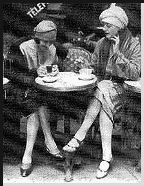 On the
documentary front, Greta Schiller's Paris Was a Woman account of the circle of
talented expat is an exquisite women that formed around the household of Gertrude Stein
and Alice B. Toklas in Paris, and their love and business affairs during the 1920s. It's
the type of beautifully-constructed and researched documentary that could simply run for
three hours. Some legitimate quibbles might be raised over the film's almost-exclusive
emphasis upon lesbian artists (Lee Miller, one of the token heteros, is represented only
in a single photograph), but this has to be one of the best documentary films of the year,
as it concentrates its energies upon a subset of the distaff side of expat life, one that
has been inexcusably neglected.
On the
documentary front, Greta Schiller's Paris Was a Woman account of the circle of
talented expat is an exquisite women that formed around the household of Gertrude Stein
and Alice B. Toklas in Paris, and their love and business affairs during the 1920s. It's
the type of beautifully-constructed and researched documentary that could simply run for
three hours. Some legitimate quibbles might be raised over the film's almost-exclusive
emphasis upon lesbian artists (Lee Miller, one of the token heteros, is represented only
in a single photograph), but this has to be one of the best documentary films of the year,
as it concentrates its energies upon a subset of the distaff side of expat life, one that
has been inexcusably neglected.
Historical accounts of filmmakers are also
prevalent this year. Who Killed Pasolini? (directed by Marco Tullio Giordana, and
adapted from his book) is an overwhelming docudramatic account of the mystery surrounding
the death of the politically and artistically controversial Italian poet and director,
killed on November 2nd, 1975, by a youth who claimed that Pasolini had made indecent
advances toward him.
Despite some lapses into pure melodrama, the film marshals a
considerable amount of persuasive evidence to suggest that Pasolini's murder, despite the
aura of gay-bashing that surrounded it, was not without political motivations or multiple
co-conspirators; a few months before his death, Pasolini wrote an angry essay in which he
noted that the corruption in Italian politics reached into the highest circles, and
demanded that even those in such positions should not be immune from arrest and
prosecution. This was an extremely provocative act under normal political circumstances,
but during a time in which Italy was being beset by political violence both from far right
and far left, it must have seemed like sedition to those in thrall to extremist
ideologies. Under the circumstances, it was much simpler for officials to demote the
killing to the status of a 'lovers' quarrel' and sweep it under the rug.
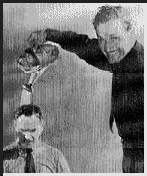 Wild Bill: Hollywood Maverick
is a badly-needed recounting of the career of the ultimate Hollywood iconoclast, William
Wellman (click the photo to see the full picture...). Though Wellman was the
director of such cinematic classics as Wings (1927), The Public Enemy
(1931), The Ox-Bow Incident (1943) and Battleground (1949), the film
correctly intimates that Wellman's reputation, by and large, has been all but forgotten.
The film also provides wry insights into the circumstances surrounding Wellman's first big
break. In keeping with Wellman's reputation, the story itself is risque and atypical, or
perhaps it is simply more truthful than the 'official' versions of how Hollywood types
attain power. It involves Samuel Goldwyn, General John 'Black Jack' Pershing and a Paris
brothel, and I'll leave it at that. Much praise is due to producer William Wellman, Jr.,
who gave director Todd Robinson carte blanche in creating this fascinating portrait. The
narration is provided in impeccable style by Alec Baldwin, who may be in search of another
career after his most recent and rather mediocre effort, Heaven's Prisoners. Wild Bill: Hollywood Maverick
is a badly-needed recounting of the career of the ultimate Hollywood iconoclast, William
Wellman (click the photo to see the full picture...). Though Wellman was the
director of such cinematic classics as Wings (1927), The Public Enemy
(1931), The Ox-Bow Incident (1943) and Battleground (1949), the film
correctly intimates that Wellman's reputation, by and large, has been all but forgotten.
The film also provides wry insights into the circumstances surrounding Wellman's first big
break. In keeping with Wellman's reputation, the story itself is risque and atypical, or
perhaps it is simply more truthful than the 'official' versions of how Hollywood types
attain power. It involves Samuel Goldwyn, General John 'Black Jack' Pershing and a Paris
brothel, and I'll leave it at that. Much praise is due to producer William Wellman, Jr.,
who gave director Todd Robinson carte blanche in creating this fascinating portrait. The
narration is provided in impeccable style by Alec Baldwin, who may be in search of another
career after his most recent and rather mediocre effort, Heaven's Prisoners.
Coming on the heels of the one hundredth
anniversary of the first public screenings of film is Sarah Moon's Lumière and
Company, a compilation of short films made by contemporary filmmakers (the
participants in this project included such luminaries as Spike Lee and Yhang Zimou). Their
task, since they choose to accept it (sorry, I'm getting ready for Mission:
Impossible at the end of the week) was to make a film with one of the Lumière
Brothers' original cameras.
This meant, for the most part, that each film would have to be shot
within the confines of one take (they were given three attempts) and only asynchronous
sound tracks could accompany the final project. Moreover, the films could be no longer
than fifty-two seconds in running time, because of the camera's capacity. The results are
as varied as the filmmakers themselves, but, more importantly, the films often have an
unintentional effect of revealing heretofore hidden facets of their makers (Zimou's
segment, shot on the Great Wall of China, demonstrates a delightfully subversive and
playful sense of humor).
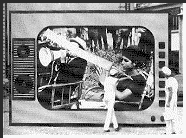 Sadly, in some cases, the films also tend to separate directors with talent from
those whose careers are built on hype. The viewer can decide who belongs in what category.
Moon's film is a touching tribute to cinema history, but why does she have to keep asking
rather silly questions such as "Is cinema mortal?" Some advice for Ms. Moon: go
into any film archive of your choosing, look at the number of pre-1951 films sitting in
cold storage, their nitrate bases deteriorating by the minute, desperately awaiting the
millions of dollars needed to restore them before they turn into inflammable goo or
powder, realize that hell will freeze over long before the majority of them can be saved,
and then reformulate the question to distinguish between the act of filmmaking and
corporate indifference to the final product. As a final touch, I would then pose the
question to Anges Varda, Jacques Demy's widow, before running for cover. Sadly, in some cases, the films also tend to separate directors with talent from
those whose careers are built on hype. The viewer can decide who belongs in what category.
Moon's film is a touching tribute to cinema history, but why does she have to keep asking
rather silly questions such as "Is cinema mortal?" Some advice for Ms. Moon: go
into any film archive of your choosing, look at the number of pre-1951 films sitting in
cold storage, their nitrate bases deteriorating by the minute, desperately awaiting the
millions of dollars needed to restore them before they turn into inflammable goo or
powder, realize that hell will freeze over long before the majority of them can be saved,
and then reformulate the question to distinguish between the act of filmmaking and
corporate indifference to the final product. As a final touch, I would then pose the
question to Anges Varda, Jacques Demy's widow, before running for cover.
And now, to love stories. The Horseman
on the Roof gives us the preternaturally lovely Juliette Binoche and the
preternaturally handsome Olivier Martinez in a swashbuckling tale about a tenacious
cholera epidemic and the love that develops between a noblewoman and a handsome, dashing
revolutionary (is there any other kind?) who race from city to city in an attempt to beat
the plague and to locate the lady's husband. From the same director responsible for 1991's
Cyrano (Jean-Paul Rappeneau), Horseman boasts breathtaking
cinematography and the occasional vestige of witty dialogue (such as Martinez's character
proclaiming that "Cholera avoids me like the plague"). The entire experience is
marred somewhat by a rather treacly ending, one which seems to drag on forever.
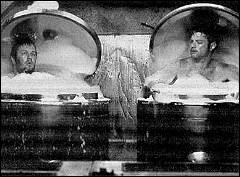 From Belgian filmmaker Frank Van Passel comes his feature-film debut, Manneken
Pis, a quirky love story between a reserved restaurant worker and a spirited
streetcar driver (the film's title comes from the name of the streetcar stop where the two
first meet). The twist in this love story comes from the fact that the young restaurant
worker believes himself to be responsible for the death of his parents some eight years
earlier and therefore is incapable of expressing his feelings to his lady love. Just for
good measure, the plot also includes a busybody landlady, embittered over her husband's
death in a V-2 raid some fifty years earlier. This bizarre stew of repressed bitterness
and thwarted love might be intriguing, if the characters weren't written to be so morose
and selfish that all they can inspire in the audience is indifference to their individual
and collective plights. From Belgian filmmaker Frank Van Passel comes his feature-film debut, Manneken
Pis, a quirky love story between a reserved restaurant worker and a spirited
streetcar driver (the film's title comes from the name of the streetcar stop where the two
first meet). The twist in this love story comes from the fact that the young restaurant
worker believes himself to be responsible for the death of his parents some eight years
earlier and therefore is incapable of expressing his feelings to his lady love. Just for
good measure, the plot also includes a busybody landlady, embittered over her husband's
death in a V-2 raid some fifty years earlier. This bizarre stew of repressed bitterness
and thwarted love might be intriguing, if the characters weren't written to be so morose
and selfish that all they can inspire in the audience is indifference to their individual
and collective plights.
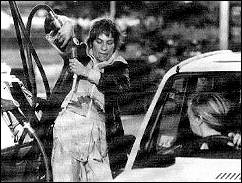 A different type of love story is Michael Winterbottom's electrifyingly perverse Butterfly
Kiss, with Amanda Plummer as a sadomasochistic lesbian serial killer and Saskia
Reeves as her dim-witted and reluctant accomplice in crime. At times, the narrative
structure threatens to wander as aimlessly as the roadways upon which Plummer's character
wreaks her havoc, but Plummer's performance is masterful and chilling, starting out on a
high note and simply never allowing the audience an opportunity to catch its breath as she
piles outrage upon outrage. A different type of love story is Michael Winterbottom's electrifyingly perverse Butterfly
Kiss, with Amanda Plummer as a sadomasochistic lesbian serial killer and Saskia
Reeves as her dim-witted and reluctant accomplice in crime. At times, the narrative
structure threatens to wander as aimlessly as the roadways upon which Plummer's character
wreaks her havoc, but Plummer's performance is masterful and chilling, starting out on a
high note and simply never allowing the audience an opportunity to catch its breath as she
piles outrage upon outrage.
An even stranger type of love story comes from Jim Jarmusch's jet-black Western, Dead
Man, which, as an account of life in the Old West, seems less of a sardonic
counterpoint to Stagecoach and more of a rather uncomfortably accurate accounting
of the state of affairs in some frontier towns before 'the blessings of civilization' set
in. 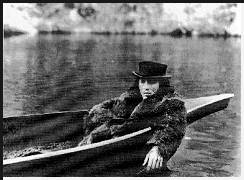 I confess to not being much of a Jarmusch fan, having
rather unpleasant memories of films that consisted of long takes of incoherent and
presumably metaphysical babblings taking place in fifth-rate hotel rooms, but I liked this
film, not least of all because of its wonderful high-contrast black-and-white
cinematography. The performances by Johnny Depp and Gary Farmer are low-key but
immaculate, the sight of Robert Mitchum is always a treat, and the dialogue crackles with
an abundance of malicious wit, but it was especially fun to see Iggy Pop in pioneerwoman
garb. I confess to not being much of a Jarmusch fan, having
rather unpleasant memories of films that consisted of long takes of incoherent and
presumably metaphysical babblings taking place in fifth-rate hotel rooms, but I liked this
film, not least of all because of its wonderful high-contrast black-and-white
cinematography. The performances by Johnny Depp and Gary Farmer are low-key but
immaculate, the sight of Robert Mitchum is always a treat, and the dialogue crackles with
an abundance of malicious wit, but it was especially fun to see Iggy Pop in pioneerwoman
garb.
Next Week: Perhaps the strangest love story of all, as
Valerie Solanas attempts to rectify an unrequited love for her artistic 'genius' in I Shot Andy Warhol; a bunch of
losers take a one-way ticket to Palookaville;
the small-town machinations in Dadetown;
and Bobcat Goldthwait as a psychopathic bank robber in Back to Back.
Contents | Features
| Reviews | News | Archives | Store
Copyright © 1999 by Nitrate Productions, Inc. All Rights
Reserved.
| |
|